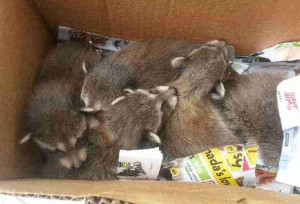Gestation Period for Raccoons
 The gestation period for raccoons is approximately 9 weeks. The baby raccoons are born hairless and blind and are reared by the mother. Mating occurs in the winter months but can go on until June so technicians who are dealing with raccoons in your home or buildings must first determine if there are young raccoons in the den, before blocking the entrance. More on that issue in a moment. Raccoon density of 10 – 25 raccoons per square kilometer has been observed. Raccoons will build their dens in chimneys, attics, roofs, crawl spaces, under decks and sheds as well as hollow trees.
The gestation period for raccoons is approximately 9 weeks. The baby raccoons are born hairless and blind and are reared by the mother. Mating occurs in the winter months but can go on until June so technicians who are dealing with raccoons in your home or buildings must first determine if there are young raccoons in the den, before blocking the entrance. More on that issue in a moment. Raccoon density of 10 – 25 raccoons per square kilometer has been observed. Raccoons will build their dens in chimneys, attics, roofs, crawl spaces, under decks and sheds as well as hollow trees.
Gestation Period for Raccoons – When to Remove Them
The bottom line the best time is before they have their young. The best way to get rid of them is to install a one-way trap door so they can get out of your attic etc. but not back into your attic. The problem gets more complex if they have young pups in the attic. Adult raccoons will literally tear your roof apart to rescue the baby raccoons who will be crying inside. On top of that, you really do not want them to die inside your attic with the corresponding smell from decaying bodies. There is another solution.
If you cannot get into the attic to catch them and remove the babies, then the only thing to do is wait until they are old enough to travel on their own. Once they get out the trap door they also cannot get back into the den inside your home. If you can remove the babies, make sure that the adults are blocked from entry. Remove the babies and place them in a box outside your home where the adults can find them. They will take them to another location where they can be safe and raised.
Most cities and towns have bylaws preventing cruelty to animals. You are best not to dispose of them in any manner other than the one above. If someone should complain, you could actually end up with a hefty fine or even go to jail depending on what you do with the babies.
If you are dealing with Raccoons in the attic or around your home, you may want to read more about these pesky animals, click here for ways to deal with them in a humane manner and also to protect yourself.
You can follow any responses to this entry through the RSS 2.0 feed. You can leave a response, or trackback from your own site.

Leave a Reply